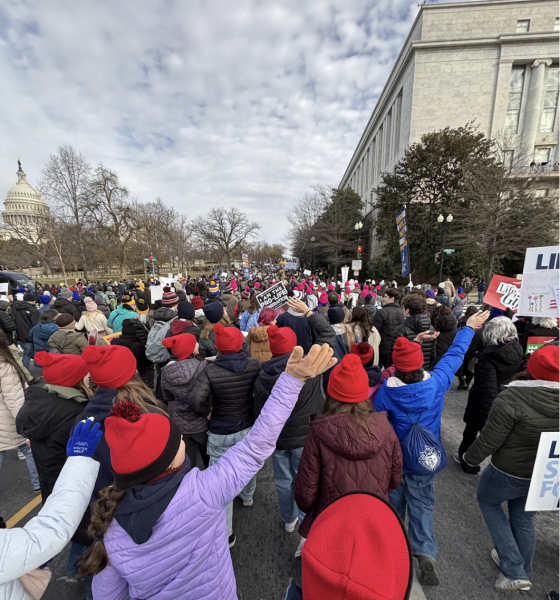Should we Open the Doors? A Closer Look at Recent Protests Against Stay-at-Home Orders
Thousands of anti-lockdown protestors gather in state capitals like St. Paul (pictured), calling upon state and national leaders to end stay-at-home orders in order to revive the economy.
Editor’s Note: A continuation of this article by Opinions Editor Anna Bachiochi ’20 can be found here.
“This is a free country!”
“Give my daughter back her senior year!”
“Reopen our doors!”
“Let America work again!”
All of these words were shouted and written on signs at the anti-lockdown rallies occurring throughout the country.
As of right now, the United States is nearing the 800,000 count in cases of COVID-19 — which is more than double of Spain and Italy’s cases combined — and the disease has reaped more than 42,000 deaths.
Hearts have been broken with families who lost loved ones, and there are plenty of those who suffer from unemployment.
Business owners have their shops and buildings shut down, causing many workers to be out of their jobs. According to the US Bureau of Labor Statistics, unemployment rates have gone from 3.5% in February to 4.4% in March. That percentage is only climbing.
Protestors have gathered in cities in Texas, Wisconsin, Ohio, Minnesota, Colorado, and Pennsylvania to argue against the stay-at-home orders. The lockdown cannot be fully faulted to the state governors.
Nor can it be solved by large protest rallies.
Think of the possibility that these people might be carrying the virus and spreading it. Just recently in Harrisburg, Pennsylvania, 2,000 people gathered in protest. Two thousand! While this certainly displays the passion these people have to take down the lockdown, it’s counterproductive.
Dr. Eric Feigl-Ding, an epidemiologist and public health scientist at the Harvard TH Chan School of Public Health, tweeted about the 2,500 in attendance at an anti-lockdown rally in Olympia, Washington: “I predict a new epidemic surge (incubation time ~5-7 days before onset symptoms, if any, and transmission to associates around that time…)… so increase in 2-4 weeks from now.”
Why can’t we blame the stay-at-home orders? Well, it’s really quite simple: Staying at home SIGNIFICANTLY decreases your chance of contracting COVID-19.
Everyone knows this. This is nothing new.
But, evidently, for some, the desire to open America is greater than the desire to stay healthy and reduce the risk for others who are more vulnerable.
California Governor Gavin Newsom said at one of his daily briefings that he understood people’s anxiety. But he added: “We must have a health-first focus if we’re ultimately going to come back economically.”
Experts such as Dr. Fauci and plenty of others are at odds with President Trump concerning the state lockdowns.
The president advocates to open up America and encourages the protests, tweeting “LIBERATE MICHIGAN” and “LIBERATE MINNESOTA.”
“They’ve got cabin fever,” Trump told reporters at a White House briefing. “They want their lives back. These people love our country. They want to get back to work.”
Is “cabin fever” a good reason to defend the possibility of 1) elongating the quarantine and 2) endangering lives during the protest?
Dr. Fauci said that cases of COVID-19 could surge if we lift the stay-at-home orders.
World Health Organization (WHO) Director-General Tedros Adhanom Ghebreyesus said during a news briefing: “Trust us. The worst is yet ahead of us. Let’s prevent this tragedy. It’s a virus that many people still don’t understand.”
There is so much uncertainty when it comes to the coronavirus outbreak, enough that it’s unsurprising that there are protests.
But what is certain is that the public rallies— especially the ones consisting of 2,000+ demonstrators, are unsafe. Americans want to stand up and want their voice to be heard. As they have always done when they feel injustice, they protest, and the people always have their opinions heard. But doing as we have always done now — during this deadly pandemic — is a vastly different scenario and remains incredibly dangerous for everyone.
Jenn Uche ’22, rising Opinions Editor
22juche@montroseschool.org











